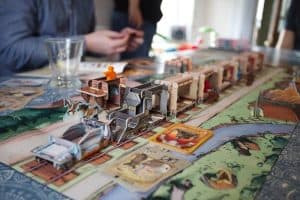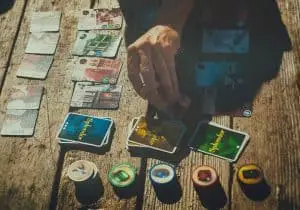Table of Contents
Ever since I was introduced to Catan as a child I have been hooked on board games as a pass time. I played board games all the way through high school, into college and still play them now in my adult years. They have always been a part of my life.
Looking back it is obvious that board games helped shape me as a person. They are a hidden tool that helped develop my social, cognitive and puzzle-solving skills – all unbeknownst to me at the time.
The cool thing that sets board games apart from most other learning tools is that they are also extremely fun to play.
It is only when I look back now that I realized that board games actually set me up with a lot of the skills I use in my everyday life (like finding solutions to problems at work or being able to navigate a tense social situation).
Board games are not only a way to have fun with friends and socialize. They help us in so many ways without us even realizing it.
The benefits of board games
Below is a list of 8 benefits of board games and why they are good for you:
- Help Maintain Mental Health
- Develop Social Skills
- Develop Cognitive Skills in Children
- Reduce Stress
- Creates Family Time
- Develop Problem-Solving Skills
- They are Fun
- Develop Life Skills
Board Games Help to Maintain Mental Health

A study published in the journal of BioPhysicalSocial Medicine looked at the current ways that board games are used in psychometric medicine to treat different mental health disorders.
The study identified that during several randomized and controlled trials that “playing of traditional board games (e.g., chess, Go, and Shogi) helps to improve cognitive impairment and depression, and that the playing of newly developed board games is beneficial for behavioral modifications…”
The fact is, playing board games requires you to use your brain.
Keeping your brain active helps to keep the brain younger (it is like exercising a muscle). It has a role to play in a healthy lifestyle as much as physical exercise.
Board games are also fun to play and have a social aspect, you play them with other people.
Because they are entertaining, chemicals are released in the brain (such as dopamine) that help with depression and feelings of anxiety.
The New England Journal has also published a study that links leisure activities like board games to a reduced chance of developing Alzheimer’s disease and wards off dementia.
I put this as the first of the 8 benefits of board games because I think it is one of the most important. Mental health is a huge issue in today’s world – one that has only just in the last 20 years been accepted by doctors as a real disease.
Board games have definitely played a big role in helping me get through some pretty tough times.
They are a great tool to stimulate your brain and keep it ‘fit’.
Board Games Develop Social Skills
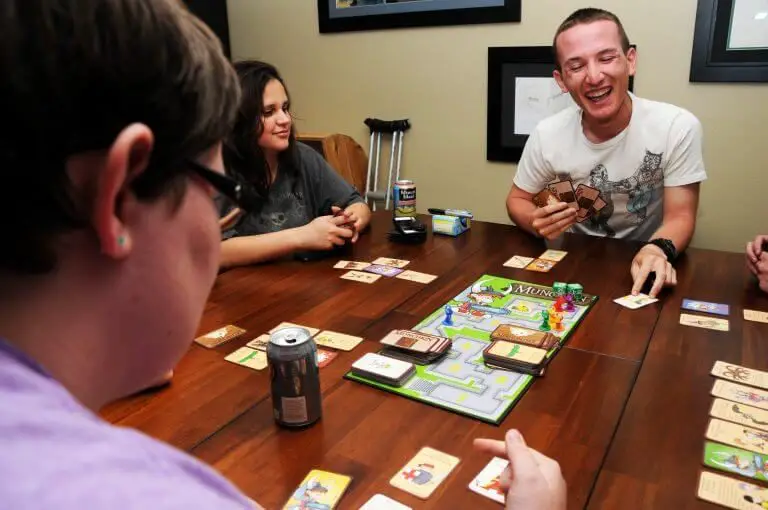
The majority of board games are played with other people. This means that (depending on the game you are playing), you are constantly having to use social skills.
Whether you are working together (cooperatively) or against other players as an opponent. Board games force social interaction.
There is a multitude of board games out there today that require different levels of social interaction – each helping to develop a unique set of social skills.
An example of this is Catan – Catan has a bargaining/trading mechanic that requires players to constantly be communicating and talking to each other in order to come to an agreement about a trade for the resources in the game.
This means players need to constantly use the social skill of negotiation during the game.
Many board games also introduce an aspect of role-playing where you assume a character in the game and play based on their traits or personality.
Roleplaying helps to develop social skills and emotional maturity as you are forced to use empathy and thinking about how your character would react in certain situations based on their personality.
Aside from the above examples, the glaringly obvious social skill development is that board games bring people together. This means there is a lot of social chatter.
Concentrating on a board game means that cellphones are put away and people are together for however long the board game takes to play through (an hour on average). With technology and the age of social media, it has become increasingly harder to get groups of people together on a regular basis.
Board games are a great way for families or couples to bond. There are even board games made specifically to bond with your family or partner as the primary goal.
Check out our article on the best date night board games.
Board Games Develop Cognitive Skills in Children
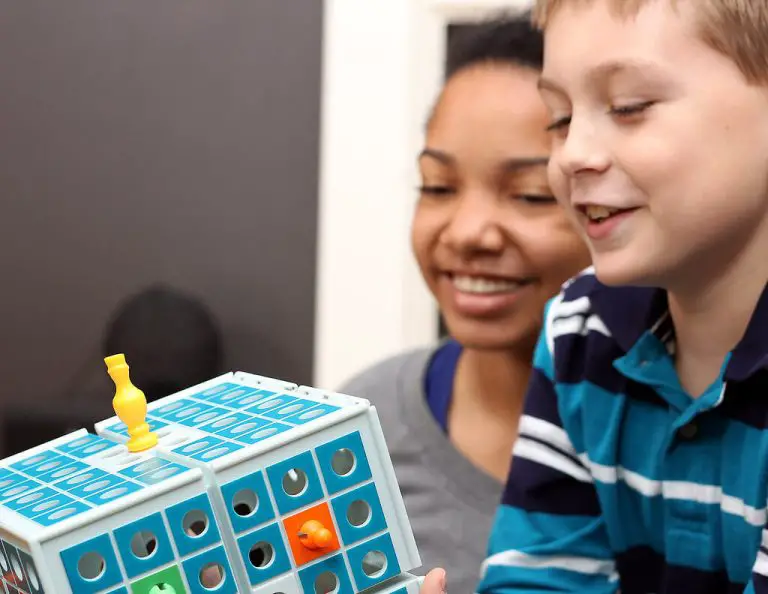
Board games are a fantastic tool to teach children and develop their cognitive and puzzle-solving skills.
Board games are subtle in the fact that they are the perfect learning tools for children but are not glaringly obvious at first.
For instance, in board games, players are generally required to take turns. This teaches children the skills of patience, having to follow rules and to share with others.
Board games also have a competitive aspect – I have found this a great way to teach my son how to handle defeat and be humble in victory. By having to compete with other players, children are able to learn cognitive skills of how to play fair, think strategically and solve complex puzzles.
There is such a large range of board games out there that you can find games that teach children a variety of skills such as pattern recognition, mathematical skills, and abstract thinking.
Board games are also a great tool to aid in educating and teaching different skills to children with learning difficulties like ADHD or autism. Organisations like Swords & Stationery in Singapore have had great success using board games as tools to help teach things like reading or spelling to children who would otherwise struggle in a traditional classroom environment.
There are endless learning opportunities for children by playing board games.
Check out our article on the best educational board games for adults and children!
Board Games Reduce Stress
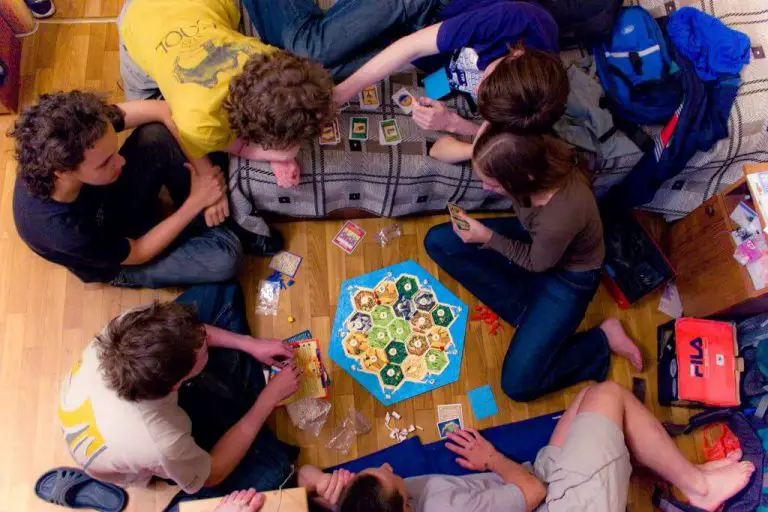
This is a huge benefit of board games to me. I work an incredibly stressful office job and sometimes I find myself bringing that stress home with me.
Board games have been a great tool for me and my wife to have some ‘us’ time and wind down after a long day.
And we are not alone. An online survey by RealNetworks Inc shows that 64% of respondents say they use board games to relax and 53% of people use board games to relieve stress.
When playing board games your brain releases endorphins. These are the ‘feel-good’ chemicals of the brain.
Endorphins help to calm you down. It is believed endorphins force muscles to relax and therefore increases blood flow. This has the added benefit of lowering blood pressure.
Board games also help you to take the focus off the days events. You are required to concentrate on the game and what you are doing.
Talking, laughing and generally spending time around people you love are great side effects of board games and the reason most people play regularly.
Board Games Create Family Time
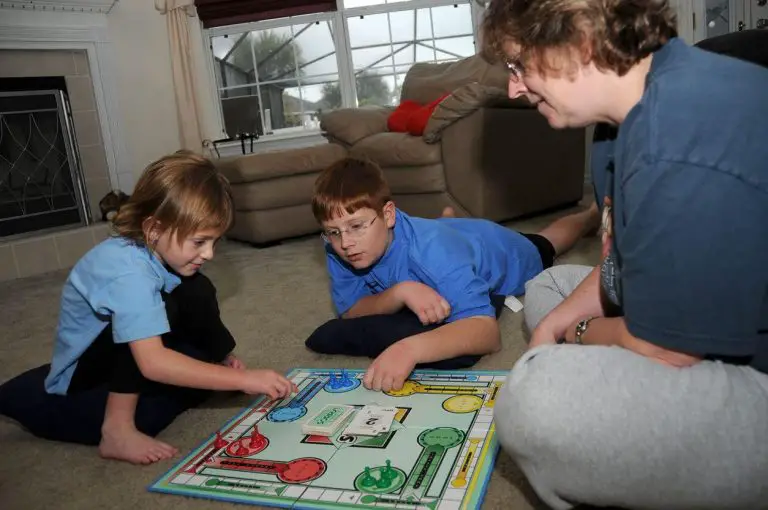
I briefly mentioned earlier in the article that with technology today and the social media revolution that it has become increasingly rarer for families to have the dedicated time they spend together as a family.
I have talked to other parents at my job about this and a few admitted that the only ‘real’ family time they get is during the 1-week vacation they have every year. That is frightening to me.
Board games have long been a tradition of families in the United States. In the afternoons once or twice a week the family would sit down around the dinner table and play a game of monopoly or Cluedo for an hour or two.
With the sudden uptrend of new board games today – this tradition is making a comeback. Games like ticket to ride or Catan are introducing new and exciting mechanics and are incredibly engaging for both children and parents.
Bonding with my children is SO important to me – we only get to spend a limited amount of time with them as parents. Board games are a great way to get children off their cellphones, away from the tv and sitting down together as a family.
Board Games Develop Problem-Solving Skills

Board games require strategic and out of the box thinking. This helps to develop problem-solving skills that can be used in other areas of your life.
I work in a job where clients come to me with unique problems and I need to think about ways that I can solve these under a certain budget.
Board games over the years have helped me to think about and approach problems in different ways. Board games encourage and allow you to practice this train of thought (without you even knowing it).
Different board games will have you thinking about problems in different ways – ways that are completely out of the box. An example of this is Escape Room Board Games. If you have ever been to an escape room before you will know what I am talking about.
Games like chess require you to think about game theory and how your opponent is going to act and how that affects you several moves ahead.
These are all skills you can apply to real-world scenarios.
Board games can even help social problem-solving skills that help deal with issues like dispute resolution and negotiation.
Board Games are FUN!
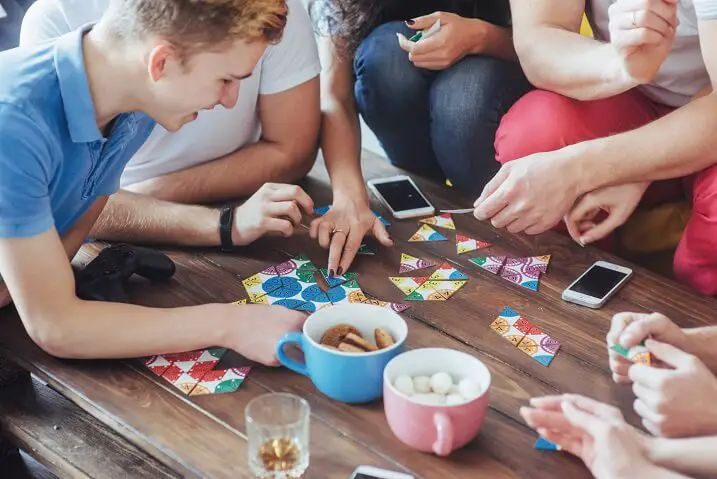
This is probably the first benefit of a board game that most people think of. Board games are fun!
Board games are a great way to pass the time. Most have replayability and are able to be replayed over and over again.
Modern games have introduced new and abstract mechanics that move beyond the simple rolling of a dice and moving X number of squares.
This has created an enormous variety of different board games that are all unique and incredibly fun to play.
Board Games Help to Develop Life Skills

As a young child I remember playing the popular game of monopoly with my father and sister. I think everyone is familiar with Monopoly – you play the game as a property investor competing with other property investors.
All players start with an amount of capital that they have to invest with the idea being to build an empire that becomes the ‘monopoly’ of the neighborhood.
Monopoly taught me something that school never did. An important life skill that everyone should know. That life skill is that people need to pay tax.
Here is a funny video that is essentially how my first experience with monopoly went down:
Board games are a great way to introduce children to life skills that they will require when they become an adult.
It was through board games that I learned what interest was. How compounding worked. The money you borrowed from a bank had to be paid back.
Board games essentially taught me all I know about money management.
These are all skills that SCHOOL NEVER TAUGHT ME. But board games did.
Final Thoughts
Board games offer a tonne of benefits. To me they have completely changed my life.
I believe that board games are critically important and should be used in schools and around the family dinner table.
Modern board games are fun. Really really fun. Learning and developing does not have to be a chore. In fact you do not even need to know you are doing it – much like me growing up.


